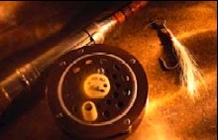The Bighorn River is rated one of the
world’s finest trout streams because of its abundant trout, dense insect
hatches, and easy accessibility. Prior to 1965, the Bighorn was a warm,
silty stream that flowed out of the spectacular Bighorn Canyon northward
into the eastern Montana prairie. With the completion of Yellowtail Dam
at Fort Smith, Montana, most of the river’s silt load was trapped behind
the dam. The river below was transformed into a cold, clear tailwater,
much like a giant spring creek - an ideal habitat for trout.
The Bighorn River’s headwaters lie in the
Absaroka, Bighorn, and Wind River mountain ranges of northwest and north
central Wyoming. From below the Montana-Wyoming state line, the mainstem
flows through Bighorn Canyon to Yellowtail Dam, a 47-mile-long passage
between the northern end of the Bighorn Mountains and the southeast
margin of the Pryor Mountains. The canyon, its sandstone and limestone
cliffs rising steeply hundreds of feet, holds the waters of Bighorn
Lake. From the Afterbay Dam, a reregulating facility 2 miles downstream,
the Bighorn River journeys 84 miles - through the Crow Indian
Reservation, past massive tree-dotted ramparts and rock outcroppings,
beside rolling hills, grasslands, and pine-covered ridges - and joins
the Yellowstone River near the old settlement of Bighorn, just east of
Custer, Montana.
Restrictions: Afterbay Dam To
Cable 600 Feet Downstream And Downstream From Bighorn FAS
Open entire year. May use live nongame bait fish (as
identified in standard district regulations). Combined Trout: 5 daily and in
possession, only 1 over 18 inches and only 1 rainbow trout.
Cable 600 Feet Below Afterbay Dam To
Bighorn FAS /dt>
Open entire year. Combined Trout: 5 brown trout daily and
in possession, only 1 over 18 inches. Catch-and-release for rainbow
trout, except anglers 14 years of age and younger may take 1 rainbow
trout daily and in possession, any size.
Artificial lures only.





